For art’s sake
Pakistan will take ‘Center Stage’ in US cultural exchange.
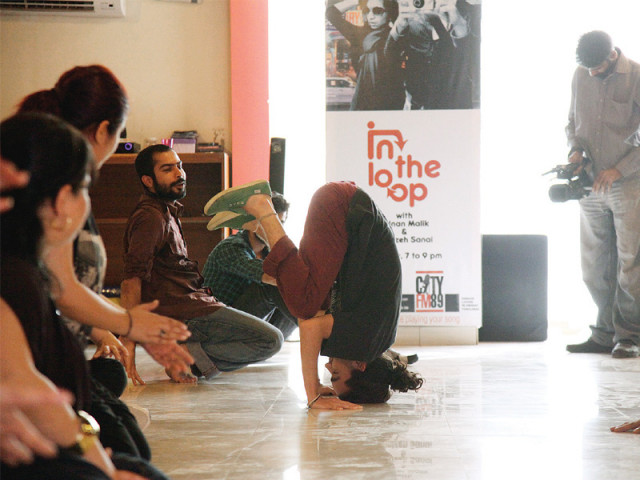
For art’s sake
Roughly a dozen part-time dancers clustered in three corners of BodyBeat’s studio, dressed in everything from sweatpants to shalwar kameez. Some were barefoot, some were in sneakers; one man even wore cowboy boots.
Asad Jafri, the director of Arts and Culture at the Inner-city Muslim Action Network in Chicago, stood in the centre of the room, pointing at the groups one by one. The bass section began a deep rhythmic chant. Then the tenor section came in like a handful of doo-wop girls, and finally, the room filled with the choral swell of the sopranos.
“Good vocals, but you’re off rhythm,” Jafri said.
“If there was a metronome, everything would be synched,” protested a member of the bass section.
Jafri grinned. “That’s the point,” he said. “Your section has to be the metronome.”
Jafri was leading a multi-genre hip-hop dance workshop in conjunction with Center Stage, a US State Department programme to bring performing artists from Pakistan, Indonesia and Haiti to towns across the US in 2012. This was the third day in Karachi for the Center Stage production team, which includes four representatives from regional US arts organisations.
“This is a research and development trip for us,” said Deirdre Valente of Lisa Booth Management in New York. “We’re meeting with different groups and trying to get a feel for how things are on the ground.” The team has spent time with performers such as Noori, Zeb and Haniya, comedians like Saad Haroon and organisations like Napa.
“Comedy is the last thing Americans expect from Pakistan, and comedians are naturally at home talking with people,” said Valente. “Mutual exchange is a big part of this programme.”
Each ensemble will perform on the prestigious Kennedy Stage in Washington DC, but performances are secondary to collaborations, demonstrations, master classes and face-to-face communication. The tours will be strategically planned to target US cities that don’t have relevant diasporas or other opportunities to interact with these cultures.
According to Andie DeArment, the information officer at the US Consulate, Karachi, “We want the artists to stay in each community for a few days, share meals with Americans and really provide an opportunity for Pakistanis and Americans to form relationships.”
Center Stage has its roots in other cultural exchange programmes, the most famous of which — the Jazz Ambassadors — helped counteract Soviet influence in the 1950s and 60s.
But according to Valente, what Center Stage hopes to accomplish is even more important. “Often government-sponsored cultural programmes are about exporting culture. This is about recognising the value in other cultures,” she said.
The State Department started with a list of seven countries that are both strategically important and often culturally inaccessible to the US. Center Stage narrowed the list based on nominations from art foundations, embassies and the performers themselves.
“This programme is about countries that are under the radar in America, not so much because of the lack of news but because of the lack of diversity of news,” said DeArment. “Center Stage received hundreds of applications, but Pakistan had more applications than any other country. There was no doubt that Pakistan would be among the final three.”
The goal is to spotlight performers who haven’t had opportunities to travel in the US. “All three countries have young populations. And they’re creatively engaged, often in forms that combine tradition with innovation, such as the Pakistani Sufi rock scene,” said Valente. “They have unique, intimate ways of looking at their roots, and we want access to that.”
Young Pakistanis have some suggestions for the Center Stage production team.
“I’d send Odyssey,” said Adel Lone, an 18-year-old student from Karachi. “They’re diverse. Their music ranges from heavy metal to melodic. They show the creative side of Pakistan, not the Taliban side.”
Abdullah Khan, a wiry 20-year-old musician, would send the atmospheric trio Basheer and the Pied Pipers. “They’re all doctors and make music in their free time. And their stuff isn’t Bollywood or the traditional drums, bass, guitar thing,” he said. “It’s more electronic because technology is crazy today. These guys are trying to evolve.”
Khan proved no stranger to American culture, as Jafri led the class through a series of break-dance poses. Khan held the turtle freeze — hands splayed on the floor, arms supporting his body, legs lifted and bent — for a solid 30 seconds. He was the only dancer to accomplish such a feat.
Khan’s teacher and the owner of BodyBeat, Hasan Rizvi, learnt break-dance in Toronto, Canada.
“The thing is, art transcends boundaries,” said DeArment. “You don’t have to know a particular language or understand the lyrics of a song to be moved by it. You feel a good dance beat, you feel a good rhythm and it connects you, no matter where you’re from. It gets beyond our easy stereotypes to reveal this common humanity.”
Published in The Express Tribune, April 15th, 2011.

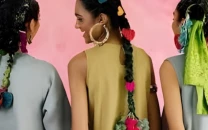
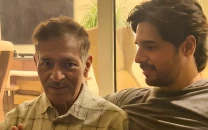

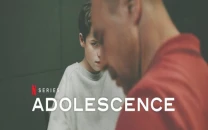
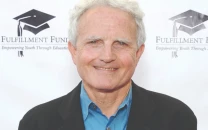
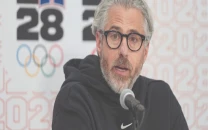












COMMENTS
Comments are moderated and generally will be posted if they are on-topic and not abusive.
For more information, please see our Comments FAQ